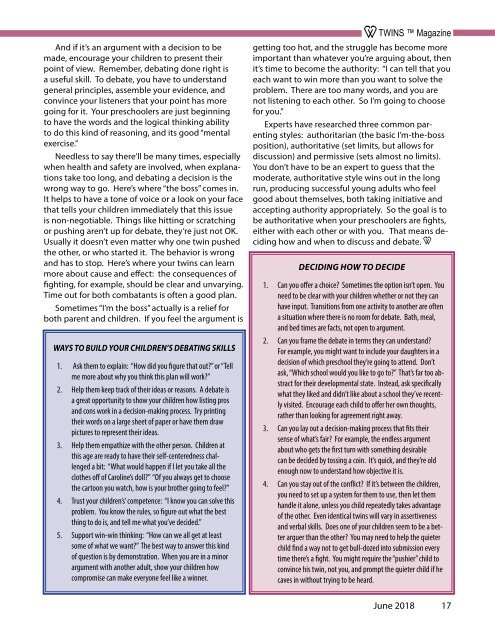2018_JUNE_FINAL
You also want an ePaper? Increase the reach of your titles
YUMPU automatically turns print PDFs into web optimized ePapers that Google loves.
And if it’s an argument with a decision to be<br />
made, encourage your children to present their<br />
point of view. Remember, debating done right is<br />
a useful skill. To debate, you have to understand<br />
general principles, assemble your evidence, and<br />
convince your listeners that your point has more<br />
going for it. Your preschoolers are just beginning<br />
to have the words and the logical thinking ability<br />
to do this kind of reasoning, and its good “mental<br />
exercise.”<br />
Needless to say there’ll be many times, especially<br />
when health and safety are involved, when explanations<br />
take too long, and debating a decision is the<br />
wrong way to go. Here’s where “the boss” comes in.<br />
It helps to have a tone of voice or a look on your face<br />
that tells your children immediately that this issue<br />
is non-negotiable. Things like hitting or scratching<br />
or pushing aren’t up for debate, they’re just not OK.<br />
Usually it doesn’t even matter why one twin pushed<br />
the other, or who started it. The behavior is wrong<br />
and has to stop. Here’s where your twins can learn<br />
more about cause and effect: the consequences of<br />
fighting, for example, should be clear and unvarying.<br />
Time out for both combatants is often a good plan.<br />
Sometimes “I’m the boss” actually is a relief for<br />
both parent and children. If you feel the argument is<br />
Ways to Build Your Children’s Debating Skills<br />
1. Ask them to explain: “How did you figure that out?” or “Tell<br />
me more about why you think this plan will work?”<br />
2. Help them keep track of their ideas or reasons. A debate is<br />
a great opportunity to show your children how listing pros<br />
and cons work in a decision-making process. Try printing<br />
their words on a large sheet of paper or have them draw<br />
pictures to represent their ideas.<br />
3. Help them empathize with the other person. Children at<br />
this age are ready to have their self-centeredness challenged<br />
a bit: “What would happen if I let you take all the<br />
clothes off of Caroline’s doll?” “Of you always get to choose<br />
the cartoon you watch, how is your brother going to feel?”<br />
4. Trust your children’s’ competence: “I know you can solve this<br />
problem. You know the rules, so figure out what the best<br />
thing to do is, and tell me what you’ve decided.”<br />
5. Support win-win thinking: “How can we all get at least<br />
some of what we want?” The best way to answer this kind<br />
of question is by demonstration. When you are in a minor<br />
argument with another adult, show your children how<br />
compromise can make everyone feel like a winner.<br />
A TWINS Magazine<br />
getting too hot, and the struggle has become more<br />
important than whatever you’re arguing about, then<br />
it’s time to become the authority: “I can tell that you<br />
each want to win more than you want to solve the<br />
problem. There are too many words, and you are<br />
not listening to each other. So I’m going to choose<br />
for you.”<br />
Experts have researched three common parenting<br />
styles: authoritarian (the basic I’m-the-boss<br />
position), authoritative (set limits, but allows for<br />
discussion) and permissive (sets almost no limits).<br />
You don’t have to be an expert to guess that the<br />
moderate, authoritative style wins out in the long<br />
run, producing successful young adults who feel<br />
good about themselves, both taking initiative and<br />
accepting authority appropriately. So the goal is to<br />
be authoritative when your preschoolers are fights,<br />
either with each other or with you. That means deciding<br />
how and when to discuss and debate. A<br />
Deciding How to Decide<br />
1. Can you offer a choice? Sometimes the option isn’t open. You<br />
need to be clear with your children whether or not they can<br />
have input. Transitions from one activity to another are often<br />
a situation where there is no room for debate. Bath, meal,<br />
and bed times are facts, not open to argument.<br />
2. Can you frame the debate in terms they can understand?<br />
For example, you might want to include your daughters in a<br />
decision of which preschool they’re going to attend. Don’t<br />
ask, “Which school would you like to go to?” That’s far too abstract<br />
for their developmental state. Instead, ask specifically<br />
what they liked and didn’t like about a school they’ve recently<br />
visited. Encourage each child to offer her own thoughts,<br />
rather than looking for agreement right away.<br />
3. Can you lay out a decision-making process that fits their<br />
sense of what’s fair? For example, the endless argument<br />
about who gets the first turn with something desirable<br />
can be decided by tossing a coin. It’s quick, and they’re old<br />
enough now to understand how objective it is.<br />
4. Can you stay out of the conflict? If it’s between the children,<br />
you need to set up a system for them to use, then let them<br />
handle it alone, unless you child repeatedly takes advantage<br />
of the other. Even identical twins will vary in assertiveness<br />
and verbal skills. Does one of your children seem to be a better<br />
arguer than the other? You may need to help the quieter<br />
child find a way not to get bull-dozed into submission every<br />
time there’s a fight. You might require the “pushier” child to<br />
convince his twin, not you, and prompt the quieter child if he<br />
caves in without trying to be heard.<br />
June <strong>2018</strong> 17

















